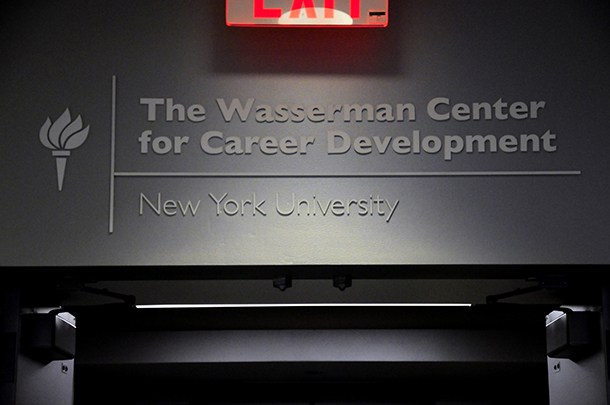Three first-generation NYU alumni sat before a crowd of around 30 NYU community members at the Wasserman Center for Career Development on Wednesday, recounting their trials and tribulations as the first people in their families to attend college, while also advising current first-generation students.
The event was hosted by Proud To Be First and the Wasserman Center’s First Class Professional Development Mentorship Program. Both organizations seek to support first-generation students achieve their personal, academic and career goals. They co-sponsored a panel of three NYU alumni who shared their college experiences as first-generation students.
Panelists included Gus Marmarinos, CAS 01’, now the SVP Global Account director at the advertising firm Saatchi & Saatchi, Melanie Calero, CAS ’16, a litigator at Debevoise and Plimpton LLP, and Jordan Tai, CAS ‘12, a resident physician at Northwell Health Lenox Hill Hospital.
In 2023, 18% of NYU’s admitted class was comprised of first-generation students. Nationally, data reported by the Center for First-Generation Success during the 2015-16 academic school year showed that 56% of undergraduates were first-generation.
According to the Center’s data, while there is a higher percentage of first-generation students on college campuses, statistics show that there are fewer first-generation students who use on-campus services such as health, career and academic support. Proud to Be First mentor and CAS sophomore, Emmanuella Kobara, commented on this issue and their importance as a first-generation student herself.
“I have found that one of the biggest challenges that first-gen students face are the lack of a support system and the lack of access to campus resources,” Kobara said. “This ultimately contributes to imposter syndrome and those feelings of not belonging.”
Imposter syndrome is the recurring feelings of self-doubt and unworthiness regarding one’s accomplishments, first discussed in 1978 article called “The Imposter Phenomenon in High Achieving Women.” Research published this month suggests that first-generation students are more likely to suffer from the syndrome in college environments.
Ethel Florencio, CAS sophomore and a former Proud to Be First mentor, recalled the importance of her support system as a first-year.
“For me, knowing that I had a system that I can reach out to was really reassuring because during my first year, I was really lost,” Florencio said. “Being able to reach out to a group of people who knew what I was going through was in it of itself enough for me.”
Throughout the evening, all three panelists discussed the adversity they faced early on in their undergraduate careers.
Calero described her early college experiences as enriching but nevertheless, challenging due to the structure of NYU.
“Being first-gen, coming to an expensive city and to a school with an extremely privileged student body, there were many times I felt like an outsider,” Calero said during the panel.
These early experiences contributed to feelings of imposter syndrome, Calero continued.
“Even after college, when I went to law school, it got less diverse, and then when I went to a law firm, much less diverse, so it’s hard,” Calero said. “It was about continuously reminding myself that just because someone else comes from a well-off family or someone else’s parent is a judge, they’re not more worthy or deserving of this education or job than I am.”
Regarding academics, Tai recalled taking on an enormous workload in his first semester of college. He ascribed his academic rigor and motivation to values instilled in him by his parents.
“They came from Taiwan in the early eighties, and for them, it was about job security — family security,” Tai said during the panel.
Touching on the high cost of living in New York City, Marmarinos described his process of adjusting to NYU.
“When you first come to the big city, you become enamored and inspired by it, but when the reality of living here really sets in, you’re left trying to stretch a meal out for three nights,” Marmarinos said at the panel.
He recalled that after his family’s business went under, he nearly dropped out of college because he couldn’t afford it. His ensuing discussion with Associate Dean of Advising and Student Services William Long convinced him to do otherwise.
“[Dean Long] said, ‘No, we’re going to find a way’,” Marmarinos said. “And we did. We looked through scholarships and he kept me at NYU, which is a testament to the university, but importantly, to someone who I will never forget.”
CAS Freshman and Proud to Be First mentee Freddy Barrera said he most connected to the panelists’ discussions on their underrepresented backgrounds.
”Coming from a Latinx background, their struggles really resonated with me,” Borrero said. “Sometimes, it doesn’t feel possible for us to achieve what we want to, but there are older people like us who are following their dreams, and it’s very reassuring.”
Borrero added that the panel was affirming in regard to his own NYU career and that the event mobilized him to help future first-generation students.
“Melanie said we belong here. For me, that’s something I need to keep reminding myself of — that I earned a spot here,” Borrero said. “The other thing for me is now you have to pay it forward: we got here so now we have a responsibility to help future generations get here too.”
Email Karina Gamez at [email protected].






















































































































































